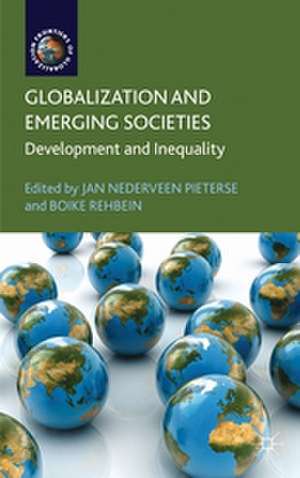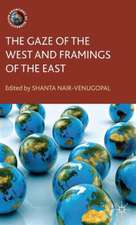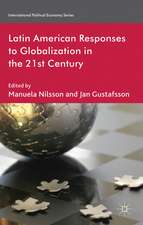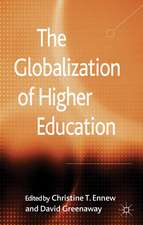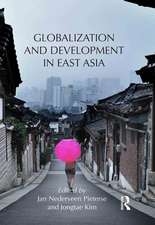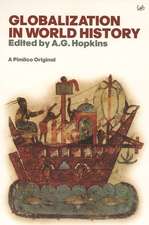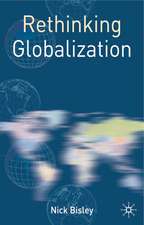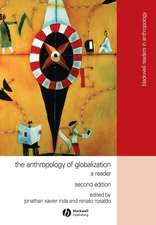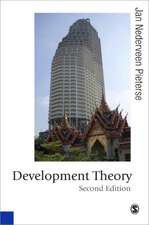Globalization and Emerging Societies: Development and Inequality: Frontiers of Globalization
Editat de Jan Nederveen Pieterse, Boike Rehbeinen Limba Engleză Paperback – 16 iul 2009
This upper level textbook provides readers with evocative and analytical accounts of
social processes that are linked to globalization and connectivity, which includes a wide
range of multi-centred connections in history, DNA analysis, technology, art populism
and political economy.
Rather than globalization, Nederveen Pieterse focuses on connectivity. His approach
to globalization differs from both structuralist accounts of the world-system, and the
institutionally-centred focus of much work in international studies. This synthesis will
provide a new resource to reconstruct theoretical approaches to globalization and
global studies.
Fluently written, clearly organized and with an interdisciplinary approach, the book
will be accessible to upper division undergraduates and graduates in social sciences and
humanities, including students and researchers from the fields of sociology, politics,
political economy, development studies and international relations.
| Toate formatele și edițiile | Preț | Express |
|---|---|---|
| Paperback (1) | 384.86 lei 43-57 zile | |
| Palgrave Macmillan UK – 16 iul 2009 | 384.86 lei 43-57 zile | |
| Hardback (1) | 389.70 lei 43-57 zile | |
| Palgrave Macmillan UK – 16 iul 2009 | 389.70 lei 43-57 zile |
Preț: 384.86 lei
Nou
Puncte Express: 577
Preț estimativ în valută:
73.67€ • 80.04$ • 61.92£
73.67€ • 80.04$ • 61.92£
Carte tipărită la comandă
Livrare economică 21 aprilie-05 mai
Preluare comenzi: 021 569.72.76
Specificații
ISBN-13: 9780230354494
ISBN-10: 0230354491
Pagini: 254
Ilustrații: 254 p.
Dimensiuni: 140 x 216 x 18 mm
Greutate: 0.34 kg
Ediția:2009
Editura: Palgrave Macmillan UK
Colecția Palgrave Macmillan
Seria Frontiers of Globalization
Locul publicării:London, United Kingdom
ISBN-10: 0230354491
Pagini: 254
Ilustrații: 254 p.
Dimensiuni: 140 x 216 x 18 mm
Greutate: 0.34 kg
Ediția:2009
Editura: Palgrave Macmillan UK
Colecția Palgrave Macmillan
Seria Frontiers of Globalization
Locul publicării:London, United Kingdom
Cuprins
Introduction.- 1. Global Why.- 2. Global How.- 3. Forty Four Theses on Globalization.- 4. Pattern Analysis.- 5. Histories of Globalization.- 6. Decentering Rome.- 7. DNA and Connectivity. - 8. Technology and Connectivity.- 9. Art and Connectivity.- 10. Borders and Connectivity, Enlargement-and-Containment.- 11. Paradoxes of Populism.
Recenzii
'This original collection offers a novel perspective: that of emerging societies and global inequalities. It is comprehensive yet focused; comparative yet cumulative; interdisciplinary yet cohesive. It presents a range of critical voices from and about the global South yet cautions that not all countries and sectors will benefit: only some capitalisms and communities will thrive as the BRICs supersede the dominance of the G-8.' - Timothy M Shaw, Professor & Director, Institute of International Relations at The University of the West Indies, St Augustine, Trinidad & Tobago
'A remarkably coherent collection of impressive essays exploring both the opportunities and the dark consequences of globalization. Between them the chapters deconstruct the concept of development, show what it means in different contexts in different societies, and alert us to the dangerous in egalitarian consequences of unplanned growth. A most welcome contribution to the growing literature on globalisation.' - Bhikhu Parekh, Professor of Political Philosophy, University of Westminster, UK
'A remarkably coherent collection of impressive essays exploring both the opportunities and the dark consequences of globalization. Between them the chapters deconstruct the concept of development, show what it means in different contexts in different societies, and alert us to the dangerous in egalitarian consequences of unplanned growth. A most welcome contribution to the growing literature on globalisation.' - Bhikhu Parekh, Professor of Political Philosophy, University of Westminster, UK
Notă biografică
JOANILDO A. BURITY is Senior Researcher, Fundação Joaquim Nabuco, and Lecturer in Sociology and Political Science, Federal University of Pernambuco, Recife, Brazil JOHANNA JANSSON is a Senior Analyst at the Centre for Chinese Studies, Stellenbosch University, South Africa ANIRUDH KRSHNA is Associate Professor of Public Policy and Political Science at the Sanford Institute of Public Policy, Duke University, USA ANAND KUMAR is Professor of Sociology and chair of the Department of Sociology, Jawaharlal Nehru University, New Delhi, President of the Indian Association of Sociology and Coordinator of the Global Studies Programme, India JAMES H. MITTELMAN is University Professor of International Affairs at American University, Washington, DC, USA SANUSHA NAIDU is Research Director of the China in Africa programme based with FAHAMU in South Africa JAN NEDERVEEN PIETERSE is Mellichamp Professor of Global Studies and Sociology, University of California-Santa Barbara, USA RAVI A. PALAT is Associate Professor of Sociology, Binghamton University, New York, USA BOIKE REHBEIN is Director of Global Studies Programme, University of Freiburg, Germany HERMANN SCHWENGEL is Professor and Chair of Sociology, University of Freiburg, Germany GANESH K. TRICHUR teaches Global Political Economy and Asian Political Economy in the Global Studies department at St. Lawrence University, New York, USA
Textul de pe ultima copertă
This upper level textbook provides readers with evocative and analytical accounts of
social processes that are linked to globalization and connectivity, which includes a wide
range of multi-centred connections in history, DNA analysis, technology, art populism
and political economy.
Rather than globalization, Nederveen Pieterse focuses on connectivity. His approach
to globalization differs from both structuralist accounts of the world-system, and the
institutionally-centred focus of much work in international studies. This synthesis will
provide a new resource to reconstruct theoretical approaches to globalization and
global studies.
Fluently written, clearly organized and with an interdisciplinary approach, the book
will be accessible to upper division undergraduates and graduates in social sciences and
humanities, including students and researchers from the fields of sociology, politics,
political economy, development studies and international relations.
Caracteristici
Examines contemporary questions such as global trade, the rise of populism, Brexit, regional conflicts and emerging economies within the context of of long term, historical patterns and perspectives Includes key analytics that run through the book such as consciousness and agency, and varieties of market economies. Sheds new light on traces and ‘entanglements’ that have been made obscure by dominant academic traditions that have traditionally studied globalization
